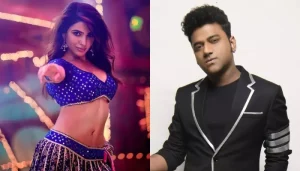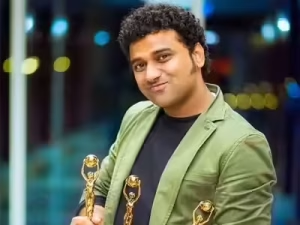Devi Sri Prasad Claims His Original Song Oo Antava Has Been Copied Without Permission by a Foreign Artist
In a recent public event, celebrated Indian music composer Devi Sri Prasad (DSP) expressed concern over a possible copyright infringement. According to DSP, his famous track Oo Antava, composed for the blockbuster Pushpa: The Rise, has been used without permission. He claimed that a foreign singer had copied the song’s core melody and arrangement. The revelation has shocked fans and brought widespread attention to the Oo Antava copycat controversy. While he did not name the artist, DSP said he was considering legal action. His statement has sparked global debate about the protection of Indian music on international platforms. Fans and fellow artists are now watching closely as this situation unfolds.
Also Read : Karan Johar Embraces Online Trolling: “It Means I’m Still Relevant and People Are Talking”
DSP Speaks About How He Created Oo Antava and Why He Is Deeply Attached to the Song
At a fan interaction event, DSP recounted the story of how he created Oo Antava in just five minutes. The composition happened spontaneously while he was working in his studio late one evening. He never imagined the song would achieve such iconic status across India and beyond. The composer described how the song resonated with global audiences and became an anthem of sorts. It was played at weddings, clubs, and festivals in multiple countries. As the centerpiece of Pushpa: The Rise, the track helped elevate the film’s music to new heights. Now, seeing his work allegedly copied without credit has been deeply disappointing. The Oo Antava copycat controversy affects him personally, not just professionally.
International Artist Allegedly Copied Oo Antava, Sparking a Global Music Rights Debate
Although DSP did not reveal the artist’s identity, fans online were quick to investigate. They pointed to “Anlayana”, a Turkish pop song by singer Atiye, released in 2024. Viewers noted striking similarities between the two tracks, particularly in the melody, rhythm structure, and background score. These observations went viral on social media, further fueling the Oo Antava copycat controversy. The similarities between the two songs have prompted conversations about global copyright laws. Music lovers are asking: when does inspiration cross the line into plagiarism? The alleged replication without acknowledgment highlights the loopholes in current international intellectual property enforcement.

Oo Antava Was a Cultural Sensation and Played a Major Role in the Success of Pushpa: The Rise
When Pushpa: The Rise premiered in 2021, it became a box office success and a cultural landmark. One of its biggest highlights was the song Oo Antava, performed by Indravathi Chauhan and picturized on Samantha Ruth Prabhu and Allu Arjun. The song’s bold lyrics, composed by Chandrabose, challenged societal double standards and made headlines nationwide. It quickly climbed music charts and became a social media trend across all age groups. The song was also dubbed into Hindi, Tamil, Malayalam, and Kannada, further increasing its reach. Given this success, the Oo Antava copycat controversy has not gone unnoticed. It raises questions about protecting such a beloved song from international misuse.
Turkish Pop Song Anlayana by Atiye Shows Striking Similarities to Oo Antava According to Listeners
Released a few months ago, Anlayana by Turkish singer Atiye caught the attention of Telugu cinema fans worldwide. Commenters noted that the beat pattern and background vocals resembled Oo Antava to a suspicious degree. From the opening riff to the tempo shifts, music fans compiled side-by-side comparisons that circulated online. Though neither Atiye nor her team has responded publicly, the similarities appear evident to many. This has led to an outpouring of support for DSP, with many demanding formal legal steps. The Oo Antava copycat controversy has since escalated, prompting Indian music lovers to call for stricter international copyright protocols.
Legal Action Is Being Considered by Devi Sri Prasad in Response to the Copycat Allegations
DSP has confirmed that he is evaluating the legal aspects of the situation and may proceed with formal charges. Although no lawsuit has been filed yet, sources close to the composer said he has consulted legal experts. The focus now shifts to comparing both songs through expert musical analysis to determine if copyright laws were breached. If proven, the Turkish singer and production house may face heavy penalties or need to issue a formal apology. The Oo Antava copycat controversy could also set a precedent for similar international music plagiarism cases in the future. DSP’s move will likely inspire other composers to protect their works proactively.
DSP Maintains a Strong Stance on Creativity and Refuses to Accept Any Form of Musical Plagiarism
Devi Sri Prasad has long stood by his commitment to originality. In various interviews, he has emphasized never remixing or copying other artists’ music. He believes in creating songs that connect emotionally with listeners while maintaining artistic integrity. DSP has composed music for over 100 films and won several prestigious awards. His catalogue includes hit soundtracks across Telugu and Tamil cinema. The Oo Antava copycat controversy goes against the values he has built his career on. That’s why he’s determined to hold accountable those who disrespect creative ownership. DSP believes that this incident should spark a wider industry conversation about safeguarding musical creativity.

The Controversy Reflects a Larger Issue About Protecting Indian Music and Cinema on Global Platforms
The Oo Antava copycat controversy represents a bigger issue beyond just one song or one composer. It shows the need for more robust mechanisms to protect Indian cinema’s music as it gains global reach. As Indian films and songs trend worldwide, they are becoming vulnerable to imitation and unauthorised use. This controversy also proves how valuable Indian musical IP has become in the global marketplace. Cultural exports must be supported with legal and technical frameworks that defend against such misuse. If unaddressed, such situations could discourage future Indian artists from pushing creative boundaries. Therefore, this issue deserves thorough attention.
What Could Happen If the Case Proceeds: Legal, Financial, and Industry-Wide Implications
If DSP files a case, legal teams will begin an in-depth examination of both songs to check for infringement. Musicologists and IP attorneys will likely get involved to compare elements like tempo, chord progression, and arrangement. If the court sides with DSP, the Turkish artist might face fines, damages, or even song takedowns from streaming platforms. This would create significant financial and reputational consequences. More importantly, it could push music labels to track copyright violations more strictly. The Oo Antava copycat controversy could drive industry-wide reforms in how international musical copyrights are handled and monitored.
Why the Oo Antava Copycat Controversy Is More Than Just a Musical Dispute
The Oo Antava copycat controversy is not only about plagiarism—it is about respect for creative effort and global collaboration. Devi Sri Prasad’s firm stance on the matter sends a clear message: Indian creators deserve recognition and legal protection. As Indian music finds its way to global playlists, the risk of theft increases. This case could inspire both stronger laws and greater awareness among musicians everywhere. Ultimately, defending songs like Oo Antava helps preserve the cultural richness and creative spirit of Indian cinema on the world stage.


